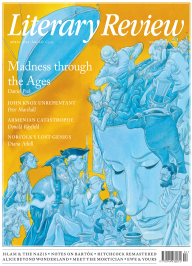Tim Stanley
Escape from Neutrality
The Sphinx: Franklin Roosevelt, the Isolationists, and the Road to World War II
By Nicholas Wapshott
W W Norton 464pp £18.99
I’ll start with a mea culpa. For a long time, I have dismissed the West’s enemies as small fry, unambitious and far away. And, for a long time, I have advocated an anti-interventionist line in dealing with them. But the massacre of Christians in the Middle East and Russia’s transparent abuse of ceasefire agreements in Ukraine has made me fear that I might have mistaken cowardice for realism. Nicholas Wapshott’s The Sphinx tells the story of an unnervingly similar epoch, in which canny interventionism proved to be a wiser course.
The titular sphinx is Franklin D Roosevelt, so described because it was impossible to tell what he was thinking. That quality proved useful in the late 1930s and early 1940s when the president had to confront war in Europe and couldn’t afford to let the American voter know his real

Sign Up to our newsletter
Receive free articles, highlights from the archive, news, details of prizes, and much more.@Lit_Review
Follow Literary Review on Twitter
Twitter Feed
‘The Second World War was won in Oxford. Discuss.’
@RankinNick gives the question his best shot.
Nicholas Rankin - We Shall Fight in the Buttery
Nicholas Rankin: We Shall Fight in the Buttery - Oxford’s War 1939–1945 by Ashley Jackson
literaryreview.co.uk
For the first time, all of Sylvia Plath’s surviving prose, a massive body of stories, articles, reviews and letters, has been gathered together in a single volume.
@FionaRSampson sifts it for evidence of how the young Sylvia became Sylvia Plath.
Fiona Sampson - Changed in a Minute
Fiona Sampson: Changed in a Minute - The Collected Prose of Sylvia Plath by Peter K Steinberg (ed)
literaryreview.co.uk
The ruling class has lost its sprezzatura.
On porky rolodexes and the persistence of elite reproduction, for the @Lit_Review: